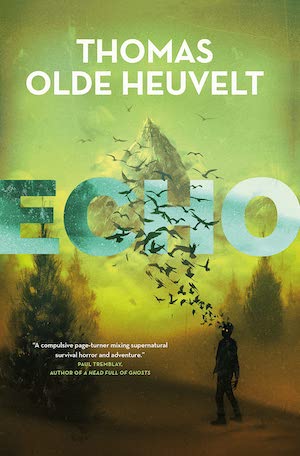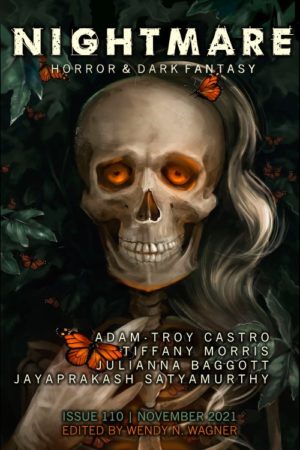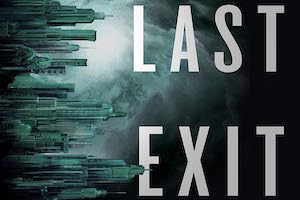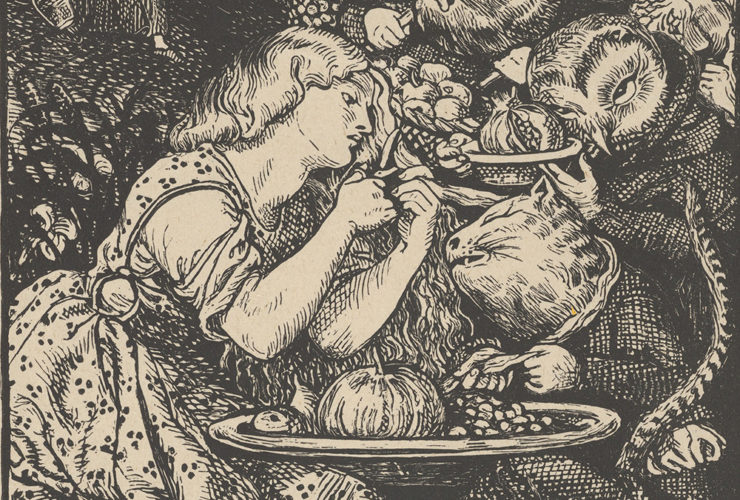Welcome back to Reading the Weird, in which we get girl cooties all over weird fiction, cosmic horror, and Lovecraftiana—from its historical roots through its most recent branches.
This week, we cover Adam-Troy Castro’s “Glimpses in Amber,” first published in the November 2021 issue of Nightmare Magazine. Spoilers ahead!
“I haven’t been keeping up my end of the conversation, really. It’s hard to keep up my half, when I’m so distracted by the object he has placed on the coffee table.”
The narrator, father of a young family, is conducting a business meeting at home. His visitor requested they meet in the dead of night, but he’s no “demon bargaining for [narrator’s] soul… just a man, a polite and professionally charming man, like a timeshare salesman.” Narrator’s wife and kids are asleep upstairs; somehow he knows they won’t wake up because “whatever this is about, it is only for [him].”
The visitor makes small talk about narrator’s well-stocked bookcases, but narrator’s distracted by an object on the coffee table: a bright green human eye encased in a clear block of crystal. It trails a nerve bundle, but isn’t gory. Or dead, for it twitches to follow movement. The visitor follows narrator’s gaze and smiles. As a reader, he says, narrator must often encounter descriptions of eyes as angry, cruel, kind, serious. Actually, eyes alone express nothing, requiring the “punctuation” of brows and lids to give them meaning.
To illustrate his point, he asks narrator to describe the green eye’s former owner. Yes, it did come from a real person, removed without coercion, the donor receiving full compensation. No, don’t assume the donor was poor. “Payment” might have involved career opportunities, legal assistance, personal fulfillment. Out of context, a mere fluid-filled orb can reveal nothing about emotion, profession, or morality.
It’s critical that narrator understands the nature of the encased eye. It’s alive, with enough consciousness to be environmentally aware and retain some memory of its former life. It can form opinions, but can’t substantively affect its surroundings. Narrator must agree to display the eye in a prominent place, one where he’ll encounter it daily. Visitors should be able to notice it; they’ll likely perceive it only as a decorative object. In exchange, narrator will receive a generous monthly stipend. Now, here’s a moral issue: the eye mustn’t be deprived of stimulation. If narrator hides it away, it will die, and the stipend will cease.
Narrator understands. Given the choice of any color eye, he opts to keep the green one. He’s always been attracted to green eyes; his wife’s only defect is that her eyes are dull gray. There’s no infidelity in this small indulgence—it’s not like he’ll be sleeping with the eye. And though he already imagines it as belonging to an Asian woman with glossy black hair, he knows it could have come as easily from “some repulsive troll of a white guy.”
The visitor issues warnings. Handle the eye as little as possible. Keep it out of his children’s’ reach. There’s a button behind the nerve bundle that narrator may push if he wishes, but the organization advises against it. To draw another analogy from reading: Narrator may usually choose a book for its content, but occasionally he may acquire one because it’s a beautiful physical object. The visitor advises treating the eye the same way, as an object possessing its own meaning—but one the narrator needn’t explore.
Narrator wants less cryptic instructions. Sighing, the visitor explains that what his organization cares about isn’t the eye as “vitreous artifact,” but as the record of one specific sight its former owner experienced, which the eye forever replays. To whatever extent narrator can distract the eye from this memory, that will be its only consolation. The sight captures the moment when the owner committed an act of “almost unimaginable depravity,” ranging from “verbal cruelty to genocide.” But so long as narrator can control the temptation to know his eye’s evil memory, it needn’t trouble him.
Buy the Book


Echo
If he can’t bear the mystery, he can push that button, and the evil memory will play like a movie in his head. The more he resists temptation, the worse it will get. Every time he sees the eye he’ll imagine the worst possible atrocities, until he can’t stand not knowing. Some do resist for a lifetime, but even they aren’t free: “Just by hinting at the terrible, the eye forever owns them.”
Narrator can still back out, rejecting the stipend. Narrator refuses. The visitor’s organization is offering too much money, and he can’t deprive his wife and children, can he?
Narrator signs forms and takes possession. He’ll position his eye on a high shelf, with a “nice panoramic view of the home it has entered,” though not where (he tells himself) he’ll notice it constantly. As the visitor prepares to leave, narrator asks the obvious question: What does his organization get out of the deal?
The visitor smiles and licks his incisors, maybe not so much like a devil, just the kind of man who’s only too common. His organization’s members find the eye-stewards’ situation amusing. It’s a game on which they take bets.
Narrator insists he’s too strong to ever push the button. Maybe, the visitor allows, and if so narrator’s fortunate because “the sight this eye sees is one that a man like [him] could never stand.”
The visitor gone, narrator feels a shift in the atmosphere, as if a threat has departed—though not entirely. Some change is permanent. Not that it matters, he tries to assure himself.
Still, he hesitates before heading upstairs.
The Degenerate Dutch: The eye-dealer suggests various sorts of human monsters from which the eye might have come: child molesters, killers, white supremacists. Particularly with two out of three involving harm to children, these examples are probably tailored to the narrator rather than reflecting any particular disapproval on the dealer’s part. The dealer does emphasize the impossibility of knowing the eye’s gender or race; narrator instantly leaps to fill those in.
Weirdbuilding: As narrator freely admits, deals with the devil go beyond well-worn trope and into everyday life under late-stage capitalism.
Libronomicon: Narrator and his wife are readers, but we never learn anything about their literary preferences.
Ruthanna’s Commentary
I’m going to put myself out there and say that a living disembodied eye is weirder and more disturbing than invisibility. A living, disembodied eye that watches your family, silently judging, is weirder still. And in the manner of any really disturbing weirdness, it’s next door to the familiar. After all, I’m typing this on my computer, next to my phone, posting to an internet full of disembodied, judgmental eyes that you can—almost—forget are watching. That you can almost forget are judging, subtly shaping your actions, raising thorny questions of morality and free will.
Admittedly, the algorithms-that-be are watching not as respite from nightmarish memories, but simply to create ever-more-tempting deals to offer around the margins of my ad-blocker. That’s better, right?
Castro’s proposed deal is an interesting one. Narrator isn’t asked to do anything horrible—from a certain perspective, he’s offering kindness to a suffering entity. In exchange for what he wants (a great deal of money), he must live with temptation. Further, it’s not a temptation to do anything inherently bad, but simply to expose himself to an upsetting experience. Again, isn’t this familiar? Don’t we meet this challenge with every clickbait headline, every phobia-scratching horror story, every intriguing-yet-worrisome fanfic tag?
Of course, none of these immerse us quite so thoroughly in the perspective of cruelty as would the Big Red Button of the eye. Perhaps that vision would bring home, as any number of articles and movies and fascist demagogues don’t, the reality that there is evil in the world. Or the reality that we ourselves are capable of it.
That feels familiar in a different way. Underlying much of Lovecraft’s work was the assumption that civilization depends upon willful denial of certain terrible truths. Let reality in, and our comfortable lives—maybe even our livable lives, and the physical laws that support them—crumble. Francis Stevens similarly suggests that remaining a good person requires determined maintenance of certain attitudes. Fear of other perspectives or faith in the positive—Castro’s eye-dealers amuse themselves by threatening both.
Clearly narrator is, in fact, the sort of person whom both temptation and knowledge will warp. He doesn’t claim, at the end, to be strong enough to stay sane and good in the face of the eye’s perspective. He claims to be strong enough to resist looking. These are very different types of strength, and the latter is rather more brittle.
And yet, people show the former sort of strength every day. Social media moderators, notoriously, burn out after manually filtering far too many videos filled with hateful rhetoric and on-screen atrocities. Trauma therapists, criminal defense lawyers, social workers… all these people deal at scale with unpleasant truths of which the eye offers only one instance. Some might even consider pressing the button a sacred duty rather than a creeping temptation. The eye-dealers presumably pick their targets carefully.
It reminds me of the point that if Othello and Hamlet were to switch places, neither would end up in a tragedy. Horror, too, is a matter of perspective. Fear is personal. Temptation, similarly, must be tailored to the individual customer. Narrator has been matched with a very specific life-warping temptation, and probably with a very specific nightmare image that he would be happier not having in his brain. The eye’s original owner must also have been matched with some payment that made them a worse person, or a sadder or guiltier one.
And beyond the temptation… again, there’s that very ordinary deal with the devil. The eye watching your home, making it subtly less safe. Judging, silently. Desperate for whatever embraces and conversations and arguments you can offer for its entertainment—and making those things all less private, and less your own.
Anne’s Commentary
My old friend, ectoplasm-raking reporter Carl Kolchak, recently returned from an (involuntarily extended) research trip to Carcosa. I’m gratified to hear the King enjoys this blog. Cassilda says hi to her Tor.com fans.
Carl’s return is fortunate. The “organization” in today’s story is a consumer hazard that yowls for investigation. After reading “Glimpses in Amber,” Carl agrees it’s an assignment right up his dark and malodorous alley; already he’s unearthed the identity of Castro’s narrator, who (in the manner of so many of our narrators) shall remain unnamed. Carl calls him Mr. D, for “dupe.” Who adopts disemsocketed eyes as casually as pandemic puppies, even if (unlike the puppies) they come with a monthly stipend and don’t destroy your house? Dupes, says Carl, that’s who. This “organization” doesn’t even have a web presence, not one Yelp review. If that’s not a red flag, what is?
Well, a request from the sales rep to meet in the witching hours would also qualify. And as far as demonic transactions go, deserted crossroads are so 1423. Every savvy demon makes house calls nowadays. They approach the mark on his own turf, so he’s lulled by familiar surroundings.
Carl, too, met Mr. D on his own turf, that bookcase-dominated living room twitchily overlooked by the eye in question. If pupil dilation was any indication, the eye was either thrilled or alarmed to have attracted press attention. Mr. D was harder to read, though the way he seemingly unconsciously tapped a fingertip on the glass-topped coffee table hinted at unease.
A transcript of Carl’s interview follows:
CARL: So, Mr. D, how did you come in contact with the “organization”?
D: They sort of contacted me. I mean, I wasn’t in the market for an eye.
CARL: But you were in the market for extra income?
D: Who isn’t? Especially with kids to worry about. Plus somebody offers to drop you a substantial stipend every month? You wouldn’t be tempted to look into it?
CARL: How substantial?
D: Significantly life-changing. Leave it at that.
CARL: Okay. I’m more interested in how your, um, new responsibility has changed your life. But first, did this—salesman – cold-call you? Put out an ad: How to make money in your spare time dusting paperweights? Or hunt you down in particular?
D: Hunt is a loaded word, isn’t it?
CARL: Is it accurate?
D: I’m not sure. Recruit might be better. Like a player for a sports team.
CARL: But aren’t they the players? Their salesman told you they find your situation amusing. “It’s a game to us,” he said. “We take bets.” You’re more a game piece than a player.
D: [adamant] No, more like a sports pro. Paid well. So what if my team has owners?
CARL: Good question, but let it alone. So, maybe the eyes are the game pieces?
D: Maybe. They’re just eyes. He kept stressing that. Things.
CARL: But things with feelings. Things that suffer, that need consolation. A “conscious living being,” the salesman told you. Neglecting it, killing it, those would be moral issues, he said.
D: He could’ve been lying. Guilt-tripping me in advance, so I’d take care of the eye. Anyway, the eyes come from people who did terrible things.
CARL: Almost unimaginable depravities.
D: Exactly!
CARL: But the eye-donors were compensated with their hearts’ desires. That sounds more like reward than punishment. And what if taking away the eyes also removed the memory of their depravity, what they saw and felt when committing it? That would be another form of compensation.
D: Or maybe the donor didn’t lose the “evil sight.” Maybe the donated eye just got a copy.
CARL: And anyway, whatever this whole transaction was about, it was only for you.
D: Look, I only meant my family didn’t have anything to do with it. Any deal we made, if it was a screw-up, it was my screw-up.
CARL: Or any deal you made, it was really for your benefit. The stipend’s lagniappe, maybe, because the core payment was what the eye remembers, the evil sight you’re tempted to let the eye play for you. The thing a man like you could never stand. Why not? Because it’s just the “depravity” you yourself want to commit? I mean, what’s with the Asian woman you want to believe donated the eye. Why do you insist keeping the eye’s an “indulgence” for you, but not unfaithfulness. Not really.
D: I’m done.
CARL: All right, but one more question? It’s the most important one for other potential consumers of this “organization’s” service. In that contract you signed: Was there any clause concerning how to get out of the deal? Like, if you’re not completely satisfied with your eye, you can return it, no questions asked? No consequences, except the financial one of giving up the stipend?
D: No. To get out, you’d have to kill the eye. Starve it. Break its casing.
CARL: Which would be a moral issue.
D: Yes.
CARL: And whatever the moral issue, anyone who accepts an eye, “the eye forever owns them.”
D: “None are ever free.” That’s what the salesman said.
CARL: If he was a man.
D: If that matters.
CARL: That’s what I wonder, the more I’m in this game.
[Interviewer and interviewee both laugh.]
[The eye twitches between them, dizzyingly fast. Maybe that’s its way of laughing.]
Next week, join us as we continue to follow Alison and Colette on the road with the dead in Chapter 2 of Hilary Mantel’s Beyond Black.
Ruthanna Emrys’s A Half-Built Garden is now out! She is also the author of the Innsmouth Legacy series, including Winter Tide and Deep Roots. You can find some of her fiction, weird and otherwise, on Tor.com, most recently “The Word of Flesh and Soul.” Ruthanna is online on Twitter and Patreon, and offline in a mysterious manor house with her large, chaotic, multi-species household outside Washington DC.
Anne M. Pillsworth’s short story “The Madonna of the Abattoir” appears on Tor.com. Her young adult Mythos novel, Summoned, is available from Tor Teen along with sequel Fathomless. She lives in Edgewood, a Victorian trolley car suburb of Providence, Rhode Island, uncomfortably near Joseph Curwen’s underground laboratory.













